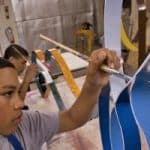ELO and CBE: A Match Made in Heaven
CompetencyWorks Blog

Once upon a time, I was involved in the school-to-work effort and one of the constant, churning complaintswas the difficulty employers, schools and community organizations had in talking to each other – different values, different timeline, different jargon. And oh those acronyms….how we stumbled over them again and again.
As I’ve talked to people across the country, such as Adam Greenman, from the Rhode Island Afterschool Plus Alliance (RIAPA), I’ve started to wonder: Can competencies become a common language between students, schools, community organizations and employers? I’m starting to think the answer is YES!
Expanded Learning Opportunities (ELOs) are opportunities for community-connected learning experiences that earn credit within and beyond the traditional classroom.
Competency education may in fact offer a way to bridge these different sectors in a number of different ways. First, the academic competencies that students are working on can help drive project design at internships. Think about it – our schools aren’t really designed for knowledge utilization – that is the 4th level on Marzano’s taxonomy of knowledge. Maybe the real-world is where students are going to be able to demonstrate they can really apply what they learned.
Second, The workplace and community service are great ways to build up the lifelong learning competencies or habits of work or habits of mind. Professionalism, teamwork, communication, problem-solving – they all have a place at the workplace even in the secondary labor market.
Third, students can also develop skills that aren’t offered in their schools with the help of a community mentor in case a teacher isn’t available with the expertise let’s say to assess speaking Chinese or the skills involved in writing music for the mandolin, or mapping the patterns of ground hogs in preparation for a city council meeting. Perhaps this is better left for badging (more about that in another blog). We may be coming to a time in which the transcript is “owned” by students as a reflection of their interests, journey, dreams, skills and their credits. Hmmmm, perhaps student should be at the table helping to design transcripts?
RIAPA and its partners in three districts Providence, Woonsocket and Central Falls is starting to take advantage of standards and competencies, even though the districts and schools there are just starting to think about how to organize themselves around learning rather than time.
They’ve defined Expanded Learning Opportunities (ELOs) as opportunities for community-connected learning experiences that earn credit within and beyond the traditional classroom. Any student can participate in an ELO if they want to:
- Study a topic that is not taught in school
- Pursue an issue they are passionate about or would like to gain experience in as a potential career pathway
- Learn outside of a traditional classroom setting
- Make up credit as an option in addition to or in place of Saturday or evening school or summer learning
- Complete a class that does not fit into their schedule
Projects are designed around what the students wants (or needs) to learn including rubrics to assess their skills along the way. Mentors, either teachers or community partners, guide students, provide feedback and assess their skill development. ELO’s are standards-based so students complete their ELOs when they have met all of their learning goals.
Some interesting issues are getting raised through this effort – including who pays for costs of the projects? When it is small scale this gets handled rather easily but what if all students at all schools were doing ELO’s once a semester to apply some of their learning or do further explorations on topics that really interested them. It becomes an equity consideration – and at some point we’ll have to get explicit about what is essential for youth development and academic excellence, what is fair and what is equitable. Also a blog for another day.
RIAPA has put together a crisp handbook (on the wiki)to help schools and their partners develop ELO’s. It’s general enough that I think just about anyone could use it to help you put together a program at your school. You’ll find links to other information on ELO and competency education at the wiki as well.
If you are interested, there is an upcoming webinar hosted by the American Youth Policy Forum:
High School Credit for Expanded Learning Opportunities in Providence, Rhode Island
Monday, July 22, 2013, 1-2:30 PM EST